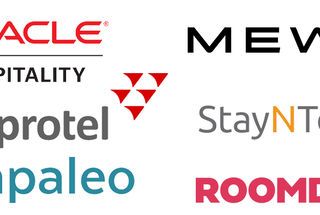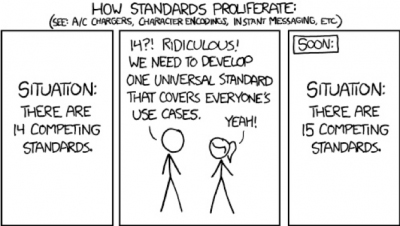Q&A: 5 Leading PMS Vendors & ROOMDEX: The New PMS – Enabling Integration

Historically, integration of hotel systems has been challenging, and even today it is still mostly a pain. However, PMS company attitudes are evolving not just in regard to the subject of integration but also in terms of the entire hotel technology ecosystem.
As part of the ROOMDEX Webinar Series, our latest discussion brought together 5 leading hotel PMS company executives to talk about this evolution. Experts from apaelo, Mews, Oracle, Protel and StayNTouch joined the panel to give their take on the hotel PMS, the evolution of 3rd party integration strategies and the direction they believe the industry is heading.
Watch the full webinar: Leading PMS Companies Reveal Their Integration Strategies
Due to time constraints, there were a couple of questions that our audience wanted to ask that didn't make it into the discussion. So, to avoid disappointment we reached out to our panel of experts to share their thoughts on some unanswered questions.
Audience Question: The PMS was the center of a hotel for the last 30 years - will it be the same in 5-10 years?
Laura Calin, VP Strategy and Solutions and Oracle Hospitality: What has not changed in the last 30 years, and will continue to be the same 5-10 years from now is that people are the center of the hotel, and although in the past the PMS on its own might have been all that was needed to perform a task or service the guest, we know that market requirements have changed. So, the PMS has and will continue to evolve, integrating and becoming part of a larger ecosystem - seamlessly unlocking and delivering all the relevant data required by employees to provide services and experiences to the guest at all customer touchpoints, in an efficient, consistent and repeatable way.
Nicole Dehler, VP Product at StayNTouch: I think that the PMS will remain the center of a hotel's technology stack. However, rather than a one-stop-shop for all hotel operations, it will be seen as a central hub to facilitate data exchange and connectivity between a hotel's tech ecosystem. Hotels will start to look at surrounding the PMS with attractive best of breed products that will help them tailor the required software solution to meet their operational and business needs and continue being innovative and service their guests in accordance to ever evolving requirements.
Richard Valtr, Founder at Mews: I think what will change is the conception of what is being managed - is the property, the rooms or will it be the customers and the services? I think the main difference will thus be the way you operate with the system, and whether it will be an administrative system, or a proactive one.
Uli Pillau, Founder at apaleo: Absolutely not. In fact, we do not believe in the concept of the "all-in-one" property management system at all. Instead, the PMS user-experience will transform into a very lean app that manages certain limited functions for the property. More importantly, this app will connect to a scalable and flexible platform in the background, which replaces the backend with automation and connectivity infrastructures. Specific features such as distribution, revenue and rate management, or business intelligence will be provided by one of the many advanced and specialized 3rd party apps, which are integrated with the same open platform. Hoteliers will have the choice of picking the apps that fulfil their requirements and not be forced to use those with limited capabilities that legacy PMS have developed. Even now, looking at the business practices of both legacy and cloud PMS, we can't justify why they remain closed and close-minded! It's only a matter of time until the industry catches on and demands more transparency and open integrations, creating a more democratic marketplace for new and innovative apps coming to market. The only way to make this work is to develop the platform with the API-first approach instead of deciding to build APIs on top of an overly complicated pre-existing PMS product.
Audience Question: What are everyone's views on charging for API access? - Whether for initial connections, project management, or ongoing per API call? How do you make these integrations not only faster/easier but also less expensive for customers?
Nicole Dehler, VP Product at StayNTouch: API access should be free to the customer - and StayNTouch has stood by this core principle right from the outset. A token fee to the vendor will help the PMS provider to maintain the environment and ensure that a connecting vendor will not jeopardize data security of the hotel. This will make it a solid and reliable solution for hotels and will also simplify the decision-making process for a hotel to bring on a new vendor of their choice.
Audience Question: In regard to the cost of integrations for free trials, it seems like the cost is waived when the platform is a cloud-based PMS. However, the truth is that the majority of hotels still use legacy, premise-based systems. How are you handling free trials for all those non-cloud systems?
Ingo Dignas, Founder and CEO at Protel: We recognize that for startup software companies, offering free trials is a modern way of entering the market. We support this right and in the event a vendor wants to have provide free trial, we can negotiate with the vendor, so it is free for the customer - even if they are an "on-premise" customers. Those are also connected to the core platform like all of our clients so it's only one integration, no matter if it's on premise, or cloud. So, the policy is the same for all our customers.
Audience Question: It is not about price, integration platform or open API, the real issue is vendor lock-in and the hotel not having full power over the data. A PMS provider should be just that and allow for the client to have full access to the data. Agree?
Uli Pillau, Founder at apaleo: Agree and Disagree. For over 30 years, PMS vendors have profited from providing closed, "all-in-one" systems in order to sell their own modules. This is why it very difficult and costly for both 3rd party apps and for hoteliers to connect to these providers. apaleo exists today because of these frustrations and artificial barriers to entry that legacy and cloud providers depend on. Our approach is exactly the opposite, we believe in connecting to all the best apps at no cost, enabling the hotelier to put their own tech stack together. It's so simple to access the data, that even tech savvy hoteliers use it to develop their own products and solutions that really enable a custom experience and product that can't be offered by any of their partners.
Believers in the API-first approach know that if you follow this strategy, then cost doesn't even come up as a question anymore. apaleo has always promised no long-term contracts, no integration or certification fees, no upfront costs to install or migrate from old PMSs, and no hidden costs to our transparent subscription fee.

Audience Question: Is there any interest or work on a standardized set of APIs or data types to replace or update HTNG?
Richard Valtr, Founder at Mews: I'd love to do that, but it's like the joke depicted here. I'd love to work on something that we can do, but I'd also love to keep innovating. If we can do both and keep working to baselines, then great.
Audience Question: I am a start-up currently building a solution for hoteliers, what should I consider when developing my software in order to potentially integrate with a PMS?
Laura Calin, VP Strategy and Solutions and Oracle Hospitality: The most important priorities for a start-up are speed to market and ability to grow market share rapidly once success is achieved with some early adopters. Any modern hospitality solution needs seamless, secure and real-time access to up-to-date data. Start-ups need to think very carefully about what sort of data access they require, where does it reside (e.g. PMS, CRM, ERP, etc.), how will the data be accessed, one way, two-way, sync, async, batch, and from which physical location (as latency matters). APIs act as doors to data and functionality. The PMS is the heart of hotel operations. Therefore, a PMS that offers rapid, self-service, seamless and secure access to modern APIs and from several locations world-wide, gives you an unrivalled opportunity not just to accelerate delivery but also to amplify its reach. This is exactly what Oracle Hospitality offers with OPERA Cloud + our Oracle Hospitality Integration Platform (OHIP). As we (Oracle) operate across nearly 200 countries and in all imaginable business models, by giving partners and customers access to our APIs, they effectively can do the same, enabling their expansion and growth.
While it remains to be seen what 2021 will bring, we believe this year will reinforce the success of integrated solutions.
The onslaught of COVID-19 upended the travel industry. As such, efficiency in everyday hotel operations is more poignant than ever. In order to survive the ongoing pandemic, hotels will need better technology systems. They will need a tech stack that allows them to become more innovative, nimble, and more customer centric. API integration is essential to enable endless possibilities for innovation and give hoteliers a competitive edge. Fortunately for hotels, PMS companies have embraced not only improved integration but an evolved view of the hotel technology stack that will help hotels be more flexible and more competitive in these uncertain times.
About ROOMDEX, INC
ROOMDEX is the technology leader in the hotel upselling software space. Its hotel upsell software automates, monetizes and ultimately simplifies the hotel room upgrade process by putting the power of choice in the hotel guest's hands.
ROOMDEX Upsell Automation uses hotel reservation, guest data and its proprietary True AvailabilityTM and Dynamic Pricing algorithms to deliver personalized digital offers, greatly enhancing the guest experience. The hotel upsell tool relieves hoteliers of the labor time required by other upselling solutions while delivering high margin revenue and a substantial ROI.
ROOMDEX is now the exclusive provider of ABS Upselling. Attribute-based selling re-imagines hotel inventory merchandising, delivering a unique and improved guest satisfaction and increased hotel revenue.
ROOMDEX leverages hotel operational and software experience gained by our team members while in leadership roles at companies such as MICROS (now Oracle Hospitality), Nor1, Duetto, StayNTouch and Shiji to develop our innovations in hotel automation, dynamic pricing, operational availability and attribute-based selling. Since founding in spring of 2020, ROOMDEX has signed hundreds of hotels across North America, Europe and Asia Pacific.
Website https://www.roomdex.io
Twitter: @ROOMDEX
Facebook: facebook.com/roomdexinc
LinkedIn: linkedin.com/company/roomdex
Youtube: click here